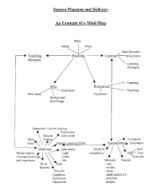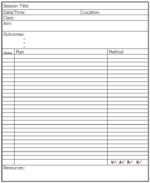Learner Centred Learning/LCL Learning Sequence Module
A learning sequence in this context refers to any plan of learning - often called lesson or session plans.
Contents
Learning outcomes
By the end of this module you will have :
- explored the planning and construction for learning sequences
- examined and critiqued the process in relation to your own work environment and need
- translated and applied the process to your own work area
| This may seem like nonsense - but give this activity a go
Scenario - you have a 20 minute teaching session coming up on ‘making a good cup of tea’ Produce a plan for this session Stop yourself periodically to explore your progress
|
When this exercise has been undertaken by participants in small groups in workshops they came up with very differing plans from each other. Compare your process with the planning process outlined below. Were there any aspects that you missed or didn't think about?
The Planning Process
The following trigger words can help ensure all areas covered
Consider
- Who are your student’s/participants?
- Where is the learning session to take place? – environment, resources
- When will this occur? – time of day, length of session
When familiar with a group of students less thought tends to be given to the first 3, it is important these are not overlooked when being learner centred.
- Why is this session being run? – the intent and aim of the session? – the learning outcomes?
- What is the focus and content of the session?
Once you have considered those you can move to:
- How will this session flow and be organised?
Learning Outcomes
Learning Outcomes describe what the student knows and can do at the end of the session.
These are key to the focus of the session and help provide direction for students. These are also an ideal base from which you can develop a plan.
Learning outcomes have three parts
- What the student will do that demonstrates learning
- The context within which the student will demonstrate learning. You might state how much supervision will be required, how much information s/he will have, how slowly or quickly s/he must show the learning, and so on
- How well s/he will have to demonstrate his/her learning.
Here is one example of a learning outcome with each of the three parts highlighted:
The student will be able to design and draft a company report using information provided in case study materials such that the final report is suitable for discussion at Board level.
- what the student will do - design and draft a company report
- in which context - using information provided in case study materials
- how well s/he will do it - suitable for discussion at Board level.
(Carroll, J. 2001 para 1)
A question to ponder is whether all 3 components are necessary for every learning outcome and why?
Bloom's Taxonomy can provide a guide of the verbs that help define the level and expectation of your learning outcomes. How well do these fit with your understandings of some of the words?
If you would like more suggestions of useful verbs along with some potential activities and products then Applying Blooms Taxonomy is a useful webpage even though it refers to the original rather than revised version of Bloom's Taxonomy.
Recording your Session Plan
There are no hard or fast rules about how you should record a session plan. It could be in list form, mind-map, diagrams, tables or any other structure that works best for you.
The key factor is that it can be followed easily and works for you as a tool during the session. You can also add information about how the session went that can be used to enhance planning for another session or a repeat of the same session at a later date.
| Here are a couple of examples of different approaches to lesson plans. Click on each image for a larger pdf version.(Remember to right click (or control click for Mac users) to open in a new tab.)
|
Planning your own sessions
Now apply your learning to your own context.
| Choose a learning session that you need to plan that may be coming up soon and use the key words to plan this session
Start with:
Take a moment to consider the environment that you are teaching in and the specific needs of the students you are working with. What is special or unique to your area? With this information in mind consider the why and write clear specific learning outcomes. Finally move on to:
|
Teaching Tips for Session Planning is a handout with more helpful reminder questions to help focus your session plan.
Bigger Picture
This module links to the overall LCL course outcome that at the successful completion of this course, participants will be able to:
- transfer adult learning and teaching principles into a specific subject/work context, e.g. workshop, art studio and hospital, by creating and critiquing a learning sequence covering a specific topic
*Consider who your learners are first before focusing on the content of your teaching/facillitation session.
|
When you have completed this module share your thoughts and learning on the Moodle Discussion board
References
Carroll, J. (2001). Writing learning outcomes: some suggestions. Retrieved April 20, 2007, from http://www.brookes.ac.uk/services/ocsld/resources/writing_learning_outcomes.html
Fry, H., Ketteridge, S., & Marshall, S. (1999). A handbook of teaching and learning in higher education. London: Kogan Page.



